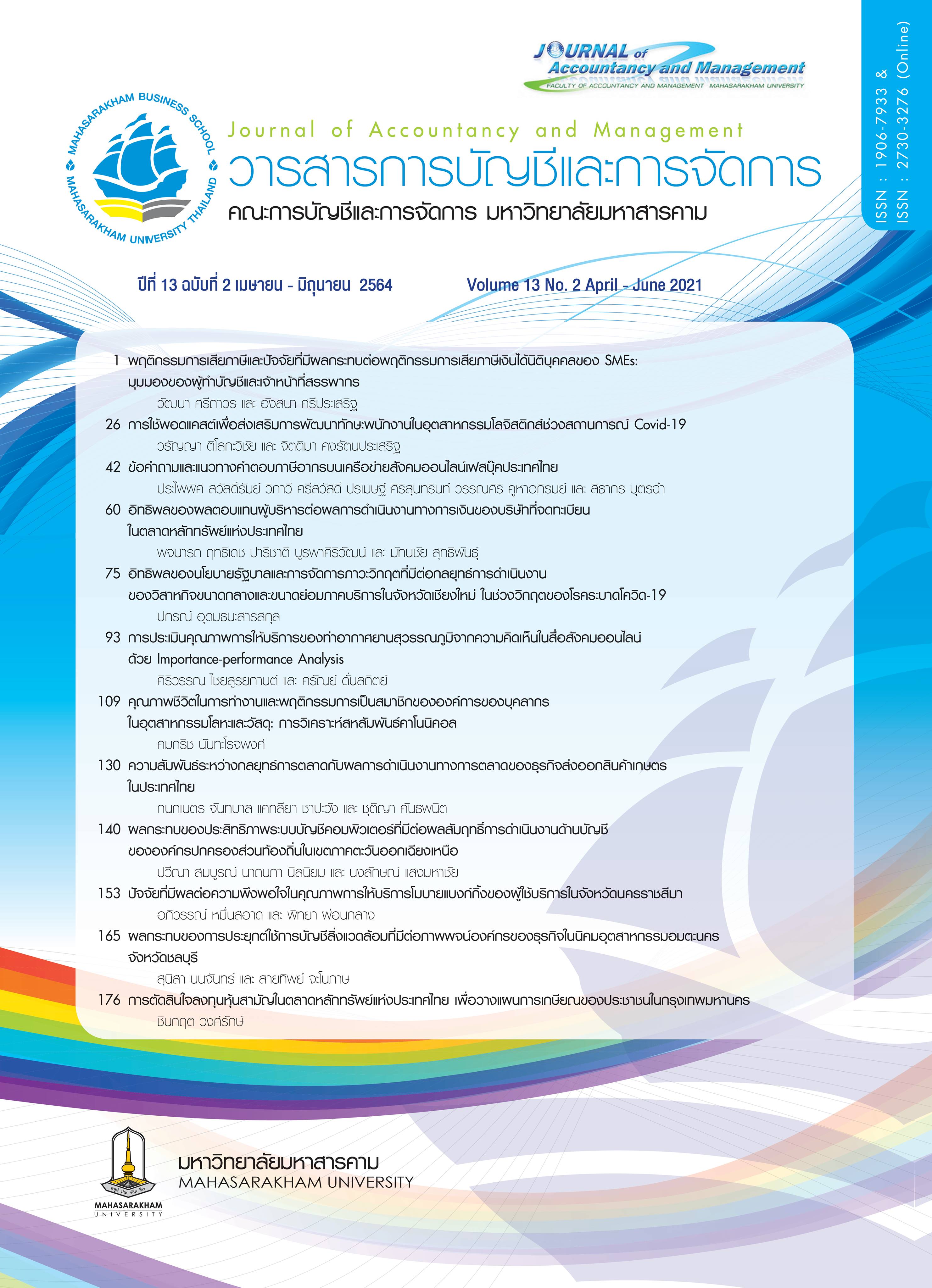การตัดสินใจลงทุนหุ้นสามัญในตลาดหลักทรัพย์แห่งประเทศไทย เพื่อวางแผนการเกษียณของประชาชนในกรุงเทพมหานคร
Main Article Content
บทคัดย่อ
การวิจัยนี้มีวัตถุประสงค์เพื่อศึกษาการตัดสินใจลงทุนหุ้นสามัญในตลาดหลักทรัพย์แห่งประเทศไทย
เพื่อวางแผนการเกษียณของประชาชนในกรุงเทพมหานคร ผู้วิจัยเก็บรวบรวมข้อมูลโดยใช้แบบสอบถาม กลุ่มตัวอย่าง
คือประชาชนที่สนใจการลงทุนหุ้นสามัญในตลาดหลักทรัพย์แห่งประเทศไทย จำนวน 385 คน ใช้สถิติทดสอบความแตกต่างค่าที (t-test) และใช้สถิติทดสอบหาความแตกต่างค่าเอฟ (F-test) การทดสอบความแปรปรวนทางเดียว (One-way ANOVA) ผลการวิจัยพบว่า พฤติกรรมการลงทุนมีวัตถุประสงค์คือ ต้องการเป็นแหล่งรายได้เสริมและเพื่อใช้ยามเกษียณ เงินได้จากการลงทุนจะนำไปสมทบเพื่อให้ปริมาณการลงทุนเพิ่มและจะนำไปใช้ในยามเกษียณ ด้านแรงจูงใจในการลงทุนพบว่า การออมเป็นการเตรียมความพร้อมสำหรับเกษียณ การออมในหุ้นเป็นการสร้างความมั่งคั่ง สามารถนำเงินปันผลมาใช้ดำรงชีวิตประจำวันได้ สามารถนำเงินปันผลไปลงทุนในหุ้นต่อได้ และเงินปันผลที่ได้เป็นแนวทางในการวางแผนเกษียณ แรงจูงใจในการลงทุนหุ้นสามัญในตลาดหลักทรัพย์แห่งประเทศไทย มีความสัมพันธ์กับการตัดสิน ใจลงทุนหุ้นสามัญในตลาดหลักทรัพย์แห่งประเทศไทยเพื่อวางแผนการเกษียณของประชาชนในกรุงเทพมหานคร ประชาชนในกรุงเทพมหานครที่มีปัจจัยส่วนบุคคลแตกต่างกัน มีการตัดสิน ใจลงทุนหุ้นสามัญในตลาดหลักทรัพย์แห่งประเทศไทยเพื่อวางแผนการเกษียณของประชาชนในกรุงเทพมหานครแตกต่างกัน เปรียบเทียบการตัดสินใจลงทุนหุ้นสามัญในตลาดหลักทรัพย์แห่งประเทศไทยเพื่อวางแผนการเกษียณของประชาชน
ในกรุงเทพมหานครจำแนกตามพฤติกรรมการลงทุนมีความแตกต่างกัน
Downloads
Article Details
บทความที่ได้รับการตีพิมพ์เป็นลิขสิทธิ์ของวารสารการบัญชีและการจัดการ
ข้อความที่ปรากฏในบทความแต่ละเรื่องในวารสารวิชาการเล่มนี้เป็นความคิดเห็นส่วนตัวของผู้เขียนแต่ละท่านไม่เกี่ยวข้องกับมหาวิทยาลัยมหาสารคาม และคณาจารย์ท่านอื่นๆในมหาวิทยาลัยฯ แต่อย่างใด ความรับผิดชอบองค์ประกอบทั้งหมดของบทความแต่ละเรื่องเป็นของผู้เขียนแต่ละท่าน หากมีความผิดพลาดใดๆ ผู้เขียนแต่ละท่านจะรับผิดชอบบทความของตนเองแต่ผู้เดียว
เอกสารอ้างอิง
ทิฆัมพร จาดสุวรรณ์. (2562). แรงจูงใจในการลงทุนและพฤติกรรมการลงทุนที่มีผลต่อกระบวนการการตัดสินใจลงทุนในหุ้นสามัญในตลาดหลักทรัพย์แห่งประเทศไทย. ปริญญาบริหารธุรกิจมหาบัณฑิต มหาวิทยาลัยธุรกิจบัณฑิตย์.
นครินทร์ เจียวสว่าง. (2558). ปัจจัยที่มีผลต่อพฤติกรรมการออมเพื่อวัยเกษียณ: กรณีศึกษาข้าราชการกรมโยธาธิการและผังเมือง. ปริญญาเศรษฐศาสตรมหาบัณฑิต มหาวิทยาลัยเกษตรศาสตร์.
บุญชม ศรีสะอาด. (2538). วิธีการทางสถิติสําหรับการวิจัย. (พิมพ์ครั้งที่ 2). กรุงเทพฯ : สุวีริยาสาส์น.
วิโรจน์ เจษฎาลักษณ์ และธนภรณ์ เนื่องพลี. (2561). พฤติกรรมและปัจจัยที่มีผลต่อการออมของผู้สูงอายุใน อำเภอเมืองจังหวัดนนทบุรี. วารสาร Veridian E-Journal มหาวิทยาลัยศิลปากร, 11 (1), 3061-3074
ศูนย์คุ้มครองผู้ใช้บริการทางการเงิน ธนาคารแห่งประเทศไทย. (2562). การวางแผนเกษียณ. ค้นเมื่อ 10 ธันวาคม 2562, จาก https://www.1213.or.th/th/moneymgt/retire/Pages/retire.aspx.
ศูนย์ส่งเสริมการพัฒนาความรู้ตลาดทุน ตลาดหลักทรัพย์แห่งประเทศไทย. (2553). การวางแผนเพื่อวัยเกษียณ. กรุงเทพฯ : ตลาดหลักทรัพย์แห่งประเทศไทย.
ศูนย์ส่งเสริมการพัฒนาความรู้ตลาดทุน ตลาดหลักทรัพย์แห่งประเทศไทย. (2554). ตลาดการเงินและการลงทุนในหลักทรัพย์. กรุงเทพฯ : ตลาดหลักทรัพย์แห่งประเทศไทย.
สรชา ตนานุวัฒน์ และนพดล โตวิชัยกุล. (2560). ปัจจัยที่มีอิทธิพลต่อการตัดสินใจลงทุนหุ้นสามัญในตลาดหลักทรัพย์แห่งประเทศไทยของนักลงทุนรายย่อยในจังหวัดเชียงใหม่. การประชุมวิชาการระดับชาติ ม.อ.ตรัง วิจัย. 391-401
SET. (2564). 10 พฤติกรรมลงทุนแบบนี้มีชัยไปกว่าครึ่ง. ค้นเมื่อ 13 พฤษภาคม 2564, จาก https://www.setinvest now.com/th/knowledge/article/38-10-habits-of-successful-investors.
Domjan, M. (1996). The Principles of Learning and Behavior Belmont. California : Thomson Wadsworth.
Harlow, W. V. (2011). Optimal Asset Allocation in Retirement: A Downside Risk Perspective. Putnam Institute-Retirement, 6 (June), 1-15.


